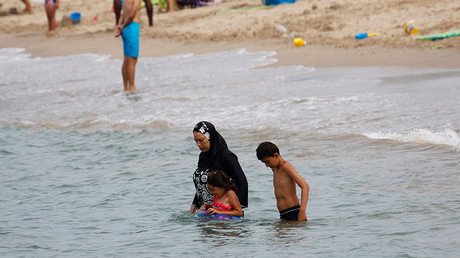French mayors protest suspension of burkini ban as debate turns ‘political’
French Riviera towns have expressed their discontent over the suspension of the burkini ban by the top French administrative court, saying the restrictions will remain.
In particular, Nice town hall said it would "continue to fine" women wearing the burkini, the mayor of Frejus, David Rachline, said that his ban was "still valid", and told AFP there was "no legal procedure" against his decision.
At the same time, Ange-Pierre Vivoni, Socialist mayor of the Corsican town of Sisco, said his burkini ban, introduced this month following a row between mainly North African bathers and locals, will also stay in place "for the safety of property and people in the town because I risked having deaths on my hands."
The ruling was only linked to the town of Villeneuve-Loubet, however other towns could follow suit.
this was never about clothes, it was about a racist state that wants to demonise Muslims to wage war #Burkinipic.twitter.com/QXck6npx3L
— Asghar Bukhari (@AsgharBukhari) August 27, 2016
The ruling by the top French administrative court took place on Friday, and stated that the ban "seriously, and clearly illegally, breached the fundamental freedoms to come and go, the freedom of beliefs and individual freedom.”
Prime Minister Manuel Valls issued a statement on his Facebook page, saying that “the debate [on the Muslim outfit in France] dates back 30 years” – first it was the headscarf in schools, then full veil in public spaces.
Now, though, the debate shifted toward the question Valls deems essential: “Is denouncing the burkini an act of stigmatizing the Muslims, or a risk for all the Muslims to be associated with political Islamism?”
Stressing the secularity of French society, Valls described the current debate as “a political battle” aiming to “build a new Islam, peaceful, independent of foreign influences, fully asserting the values of the Republic.”
Just over a week ago, the French minister of women’s rights Laurence Rossignol backed the ban, though, saying that the burkini was “hostile to diversity” and aimed at “hiding women’s bodies to control them better.”
The French public were split on the issue, too. Following the incident in which a Muslim woman was forced to take off her long-sleeved top and pay a fine, many expressed their outrage and describing the situation as “disgusting”, “ridiculous” and “public humiliation”, while others chanted “We are Catholics here,” opposing the Muslim outfit.
READ MORE: French burkini ban sparks beach-themed protest in London (PHOTO, VIDEO)
Outside France, the ban provoked debate, too: for example, London’s Muslim mayor Sadiq Khan condemned the prohibition, saying women shouldn’t be told what to wear, while Robin Tilbrook, the chairman and founder of the English Democrats, said the burkini issue “demonstrates that they [Muslim immigrants] don’t want to integrate with European culture.”
The burkini, a swimsuit that covers the whole body except the head, was outlawed in Cannes, Nice and nearly 15 other south-eastern towns since it “manifests adherence to a religion at a time when France and places of worship are the target of terrorist attacks.” The ban was supposed to step up security and, apart from that, increase hygiene at French beaches, authorities claimed.
WATCH MORE:













